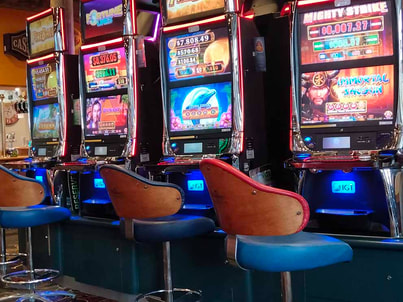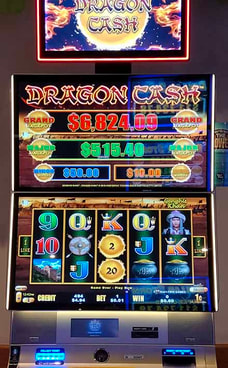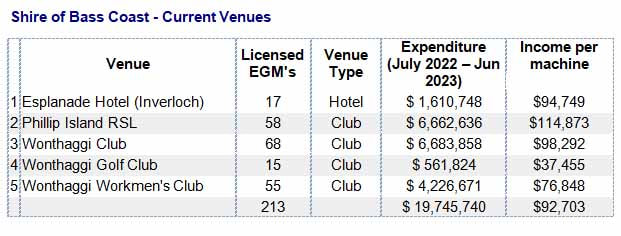 Almost $20 million was lost on Bass Coast’s 213 pokies in 2022-23.
Almost $20 million was lost on Bass Coast’s 213 pokies in 2022-23. IT’S 9.48am when I enter, feeling slightly ashamed. I’ve warned my friends, in case they happen to be passing by and see me slinking in to the pokies. And worry for me.
They needn’t. I have many unfortunate addictions but this isn’t one of them.
I sign in to the club as a visitor, which is done by putting my licence in a card reader and receiving a three-day pass. It’s only later that I read the pass and see that I’ve certified that I live a minimum of 10kms from the venue. (I don’t.)
The gaming room is tucked away down a passage, far from prying eyes. This is actually a requirement for pokie venues. And staff are not allowed to disclose the identity of the clients. Make no mistake: there is embarrassment about entering a pokies venue. I hope I don’t meet anyone I know.
I said my friends needn’t worry about me, but I’ve read the stories of addiction: how the heroin addict was hooked after a single mind-blowing shot; how the now homeless gambling addict started with a lucky win.
A friend of mine was a pokies addict. Not on the scale of people who mortgage and lose their home or steal hundreds of thousands from their employer, probably because she didn’t own a house and she didn’t have a job. From Dorothy I learned that the addiction is not about winning. She couldn’t walk out of a pokies venue with money in her pocket. Even if she won a jackpot, she had to put it all back. She wasn’t stupid but it was like an itch.
So I must be the only pokies player hoping not to win. I find a machine where I have a view of the room and put in my $10 reluctantly. I don’t want to give them ANY of my money, but nor do I want to attract attention. To my surprise and relief, the machines allow you to play for any denomination between 1 cent and $5. If I play for 1 cent, even if I win I’m going to make about 50 cents. Surely that won’t hook me.
“Player … playing … games … entertainment …”? Weasel words. It’s hard to imagine a more dispiriting activity than this. And yet playing can also mean to enter an imaginary world and that’s what this place is. The clink of tumbling coins, the flashing lights, the huge multicolour screens, the subdued lighting, the classic rock ballads of the `70s and `80s. Everything about this place is designed to give an illusion of fun and excitement.
And an illusion of company. This is where you come when home is too lonely. There are other people here but no one talks to anyone else. When the cacophony of tumbling coins starts, I’m the only one who turns to look. It’s clearly a place where you mind your own business. After a while I understand why you don’t turn to look: for all the razzamatazz, most wins are small.

I’m playing Genghis Khan – DRAGON CASH. I read the Grand Jackpot as $6,824,090, though when I look more closely it is $6,824.09 and the Major Jackpot is $515.40. A small information button takes me to a screen displaying the odds: The chances of getting 5 x Genghis Horses (I presume this is the Grand Jackpot) is apparently 1 in 122,262.
I also note "Total Theoretical Return to Players of this Game" = 90.15%. I presume that's every spin, so it's like compound interest in reverse.
I press Play a few times and notice I've already lost $3. Sure, I’m playing for 1 cent but somehow I’m also playing 50 lines. How did that happen?
At last she has a win. The screen lights up and there’s a triumphal sort of noise. That’s a lot of bells and whistles for $10. At least I think it’s $10. So much is happening, and so fast, that it’s hard for me to follow. She gets four free spins but none of them win. It takes about three and a half minutes to eat up her $38. She opens her wallet and feeds another $50 note into the machine’s hungry maw.
$38 in three and a half minutes … that’s $600 in an hour. What if you stayed for a morning, a day? Came back every payday or pension day?
Bass Coast's losses were 25 per cent higher than the previous year, although that included several periods of lockdown for Melbourne residents and local restrictions in 2021.
A comparison of the monthly totals shows substantial rises in January and February this year, as the visitors returned, an 8.4 per cent rise in March, falls of 5.5 and 1.8 per cent in April and May, and an 8.6 increase in June.
I’m curious to know how much of the $20 million we lost on the pokies in Bass Coast is coming from vulnerable gamblers.
said Victorians lost about $3 billion on the pokies in the past financial year but the cost of gambling harms – financial distress, mental health concerns and relationship issues – was around $7 billion a year, over twice as much.
In June, the Victorian Gambling and Casino Control Commission released a Statement on Harm Minimisation which makes it clear that venue operators’ obligations to vulnerable customers go beyond merely complying with the law.
I meet Steve Curtis, manager of the Wonthaggi Club, to ask how his club manages problem gambling. “I wouldn’t think it would be in the interests of clubs in a small town like Wonthaggi to send their members broke, unlike the big city venues,” I venture.
| Steve Curtis gently rebukes me. “I don’t know of any clubs that want to send their members broke.” Point taken. He says there is constant evaluation within the club. “We address it at our board meetings, our strategy meetings, and we discuss best practice with industry bodies. “All our staff have responsible gambling training so they can perform those duties and our supervisors have a higher level of training. There are Responsible Gambling Officers on site throughout the day. Their job is to try and identify people showing signs of problem gambling.” These signs include spending extended periods of time or money in the venue, showing distress, talking about money and – most importantly – changes in behaviour. “It’s often about breaking the concentration of the gambler who is ‘in the zone’," Steve says. "Staff might offer them a break. ‘Would you like to sit and have a coffee or a drink?’” | THE FIGURES
|
If the gambler is receptive, they can be referred to a counselling service (La Trobe Community Health performs that role in Bass Coast).
People can also sign a deed of self-exclusion from any venue for anything from six months to two years. Importantly, the exclusion order only applies to the gaming room so the gambler can still come into the club for a meal or a function, allowing them to maintain their social contacts.
“Playing the pokies is lawful and people can choose to do it. The poker machines have information screens that state the chances of winning are low and the returns are in favour of the operator.”
Steve Curtis, manager of the Wonthaggi Club
While it’s compulsory for all venues to have Your Play enabled on their machines. It’s still optional for users, though the new regulations announced by the State Government in July are likely to make it compulsory.
Other measures announced by the Government include:
- $100 load limits, down from the current $1000. You can play more but it will take more effort.
- Standardised closing hours from 4am-10am at every Victorian club and hotel to ensure a six-hour break for gamblers. (The Wonthaggi Club already has a minimum eight-hour break – from 1am on Saturday morning to 9am opening on Sunday – but will have to open an hour later at 10am once the new regulations come into force.)
- Minimum spin rate will increase from 2.1 seconds to 3 seconds, potentially reducing losses by almost 50 per cent over a given period. (Many of the Wonthaggi Club’s machines already have slower spin rates.)
The measures are expected to come into force by mid-2024.
Steve says the club doesn’t have a problem with measures to reduce gambling harm, though it will cost about $500 per machine to program them to meet the new regime.
While it could mean some staff losses he doesn’t expect it to affect turnover. He points out that the revenue from the poker machines funds a club with 4600 members and 66 staff, making it one of the town’s biggest employers.
As the interview wraps up, Steve asks if he can add something.
“Within this area,” he says, “I make it a habit to try and help as many people as possible sign up to the self exclusion program. If anyone is concerned about their own behaviour or wants to know about options, they can come and see me any time. The what is me. The where is here.”
To my surprise, I’m somewhat reassured by the responses from the shire’s biggest operator. Steve’s concern seems genuine. After all, he is a local too. There are advantages to living in a small town where a problem gambler could be your neighbour, sister or friend.
